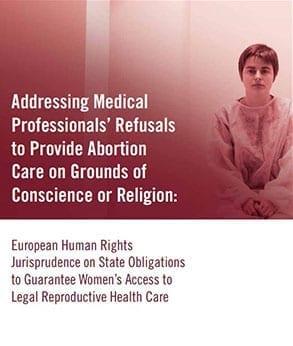No Relief in Ireland
When Amanda Kellet and James Burke went to a Dublin hospital for their 21-week ultrasound, they were looking forward to finding out whether they were having a boy or a girl.
“We were over the moon,” Amanda later wrote to her friends on Facebook. “So happy to be expecting our first born child. Our time was spent in delighted anticipation, planning and talking of baby names, thinking of all the changes having a child would bring to our lives.”
Instead, Amanda and James came face to face with some of the most restrictive—and confusing—abortion laws in the world. Technically, Ireland allows women to end pregnancies when their lives are in danger, but the absence of regulations to guide doctors and patients has made abortion even in those situations virtually impossible to access.
The sonographer, James remembers, signaled the gravity of the situation with her quiet throughout the scan. When she did eventually speak, “she said she was very worried, that she could only see three chambers of the heart and there should have been four.”
Tests soon established that the fetus had Edward Syndrome, or Trisomy 18, a genetic disorder that offers no chance of survival.
When the Irish government indicated late in 2012 that it would put forth new legislation addressing abortion, many people hoped that some measure of common sense would prevail. Instead, the proposed new law offers a hollowed-out exception—for women considered to be a suicide risk—to Ireland’s nearly comprehensive abortion ban, and no relief to families that face tragic circumstances as Amanda and James did.
For Amanda, the choice was clear.
“If we continued the pregnancy,” Amanda said, “I would face the next three and half months wondering every day if my baby was still alive or had died inside me, and knowing that even if she made it to delivery, bringing her into the world was no kindness.”
The couple chose to end the pregnancy. But instead of being able to turn to their Dublin hospital for the care they needed, they were told that such a procedure was “not available in this jurisdiction.” In other words, Irish law does not even allow terminations in cases where the fetus is incapable of surviving outside the womb, forcing women and couples to find help outside of their own country. Amanda and James would have to travel to the United Kingdom—and overcome the significant emotional and logistical barriers created by Ireland’s inadequate abortion legislation.
This problem won’t be improved by Ireland’s proposed new Protection of Life during Pregnancy bill as it currently stands. The bill has been the focus of great debate in recent weeks over the provisions that allow for termination if there is a threat that the pregnant woman might commit suicide, but it makes no provision for families with a pregnancy that is not viable to deal with that problem in a humane way.
For Amanda and James, this meant that while in addition to dealing with their grief, they also had to begin making complicated plans to travel to the UK, booking flights and accommodation, and arranging to pay thousands of euros in medical fees to an unfamiliar health system – all the while feeling like criminals and speaking “in euphemisms to hospital staff in Ireland” about their plans.
As James points out, it was not until they reached Liverpool Women’s Hospital that they were met with some professional compassion. “It was the first time a medical professional had said this was the right thing to do.”
They made the trip to Liverpool with the full support of their friends and family but they know that, because of the culture and the legal situation, not everyone faced with this situation in Ireland is as fortunate.
“The staff told us they regularly had women over from Ireland who were faced with this dilemma,” Amanda recalled. “They said that often times the couples chose not to tell anyone of their decision, not family, not friends, not event their doctors. These couples come over in complete secrecy, and hold the truth of how the pregnancy ended as a dirty secret in their hearts for fear of judgment.”
There has been a legal vacuum in the field of abortion care in Ireland for 20 years. Amanda and James and many others in their situation assumed that when the government finally proposed a bill for legal abortion, terminations of fatal fetal anomalies would be included. Nearly 80 percent of Ireland’s population supports legalization in these circumstances. The extremely narrow language of the proposed bill illustrates that Irish politicians are way behind the rest of the population on this issue. It is time they catch up.
The Irish government is also completely out of line with international human rights standards. Currently Ireland shies away from its obligations and, instead, leaves it to its neighboring countries to offer relief and support to women in Amanda’s situation. It is time that Ireland assumes responsibility.
Human rights bodies from Europe and the UN have repeatedly called for action to humanize the Irish abortion law in order to safeguard women’s fundamental rights. Together with its Irish partners, the Center is now exploring how the Irish government can be held accountable internationally for the human rights violations that it subjects women and couples to.
“I realize that abortion is and will always be highly contentious issue,” said Amanda. “But when your baby is not going to live, how can it be justified that a pregnant woman must sneak over to England like a criminal to do what she feels is the most humane thing?”


